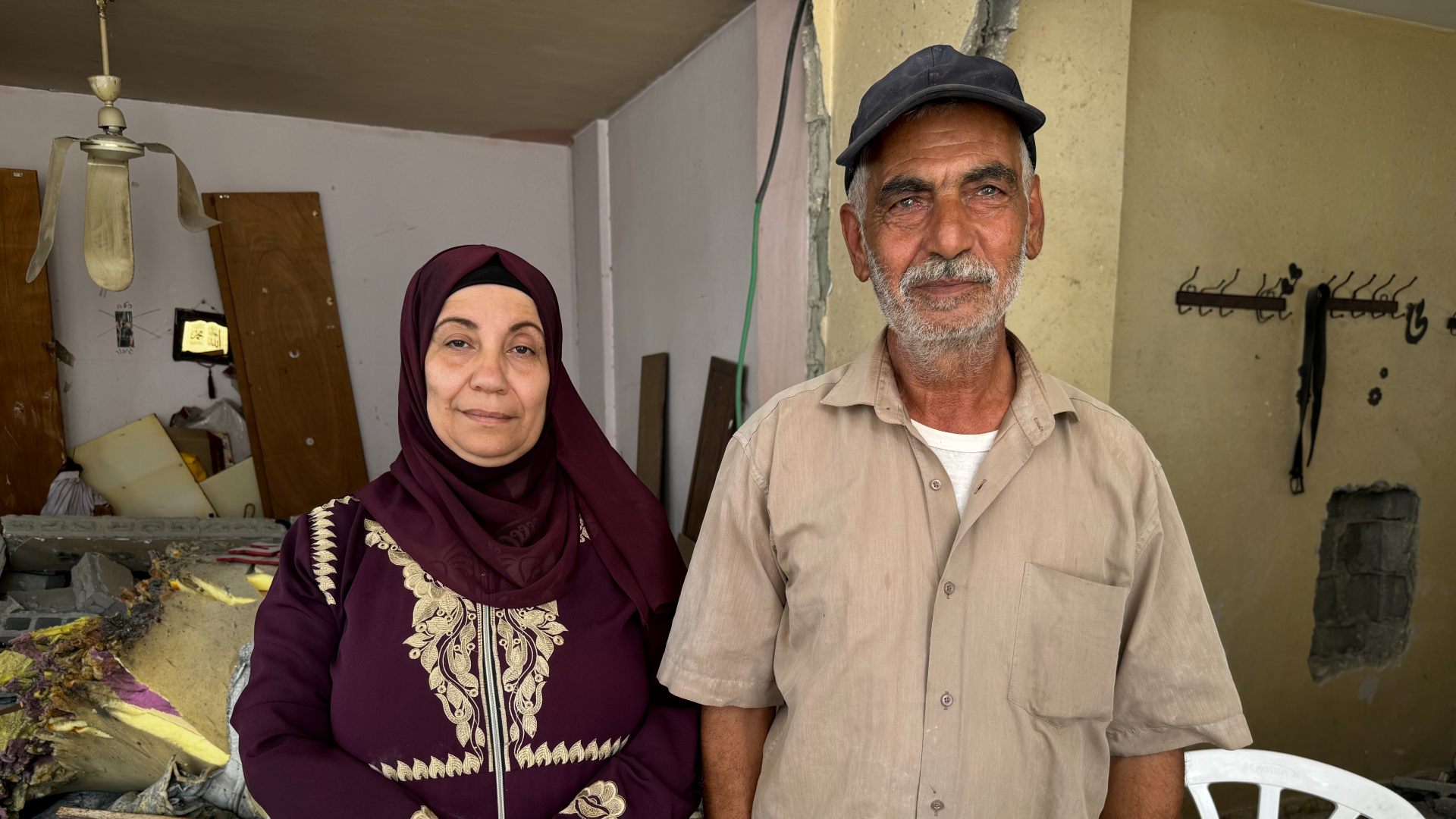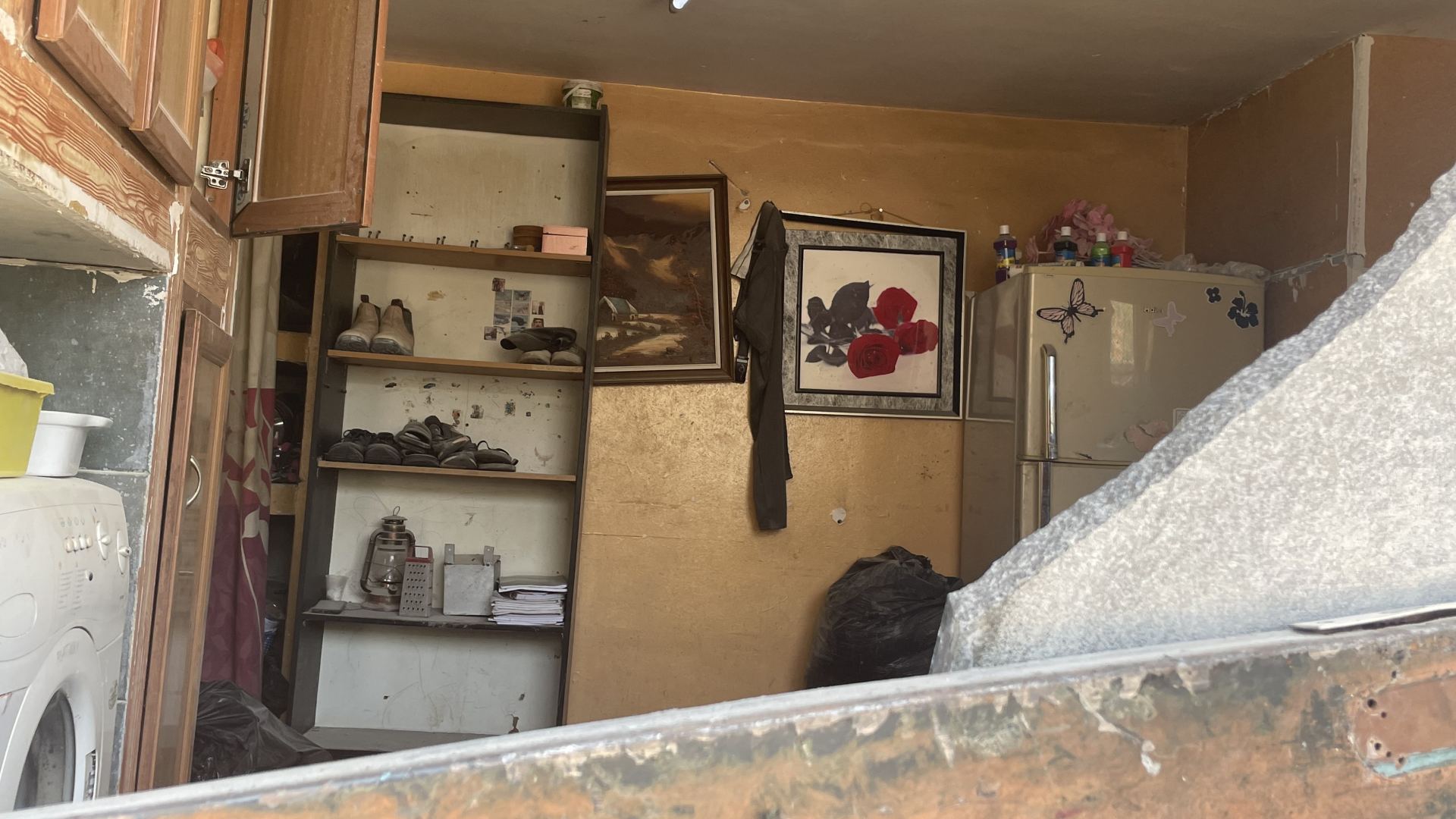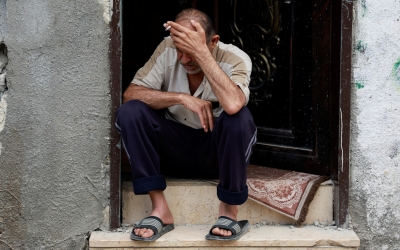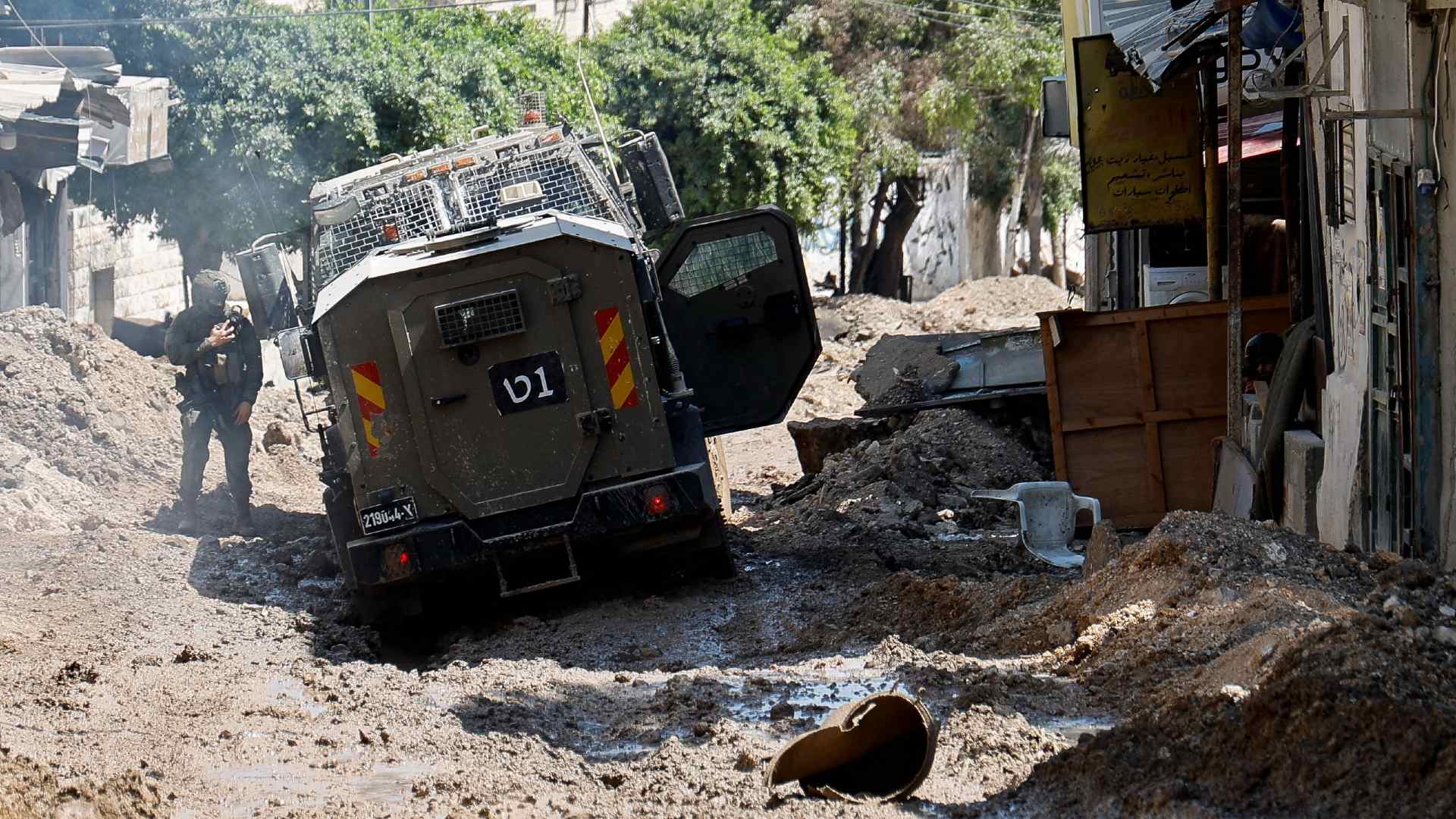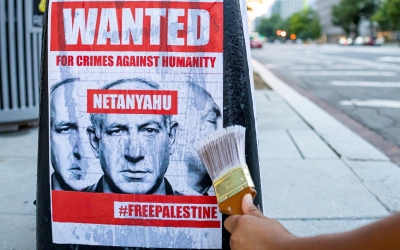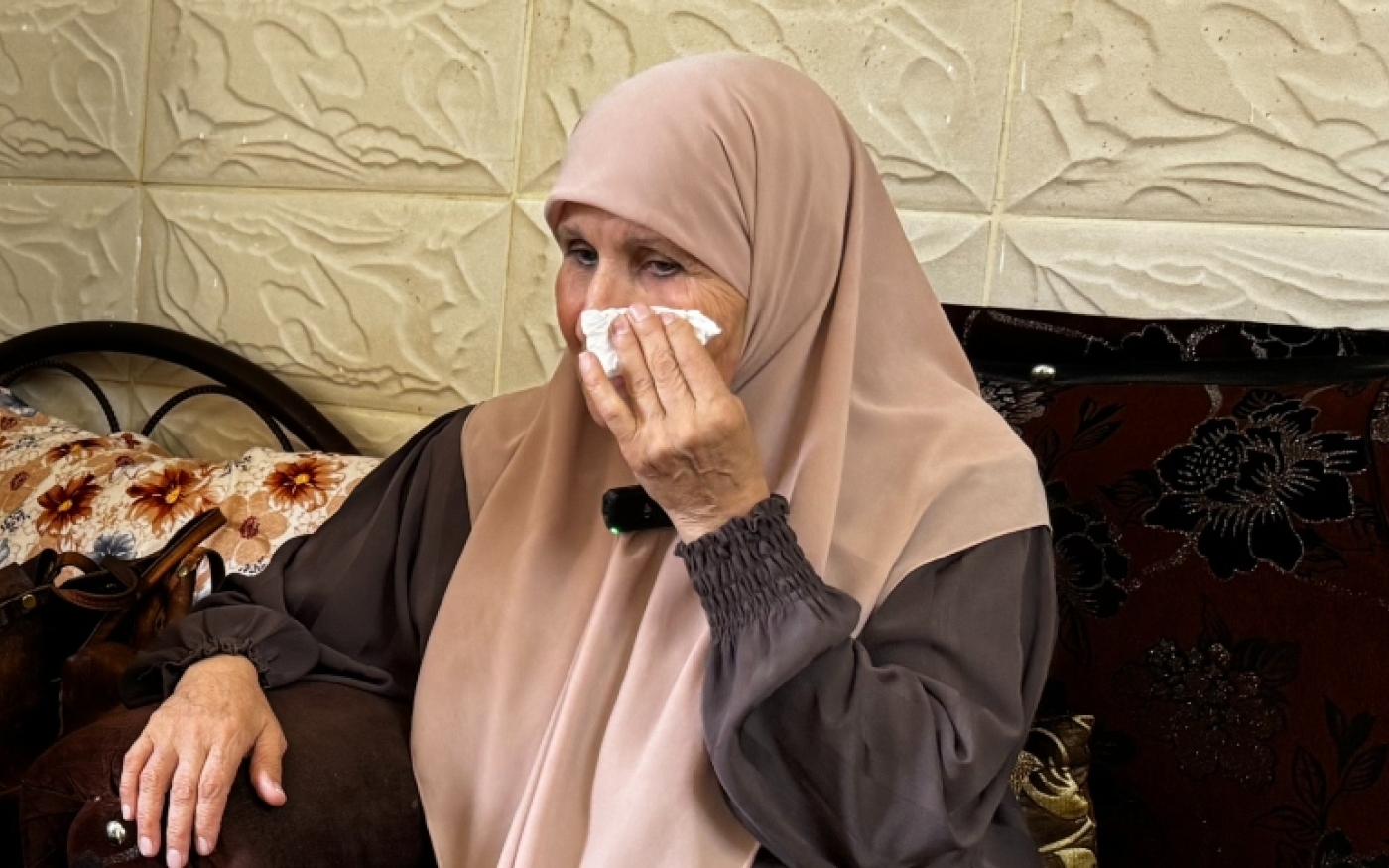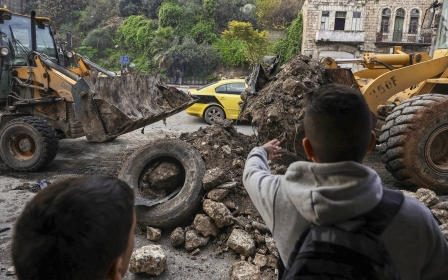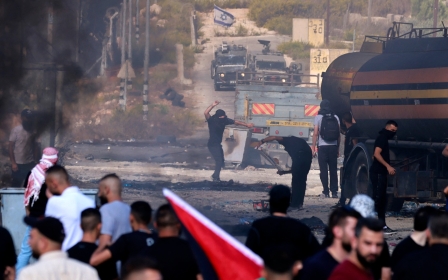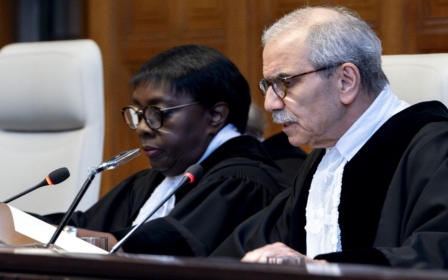Nur Shams: Inside the West Bank camp terrorised by Israeli air strikes, bulldozers and snipers
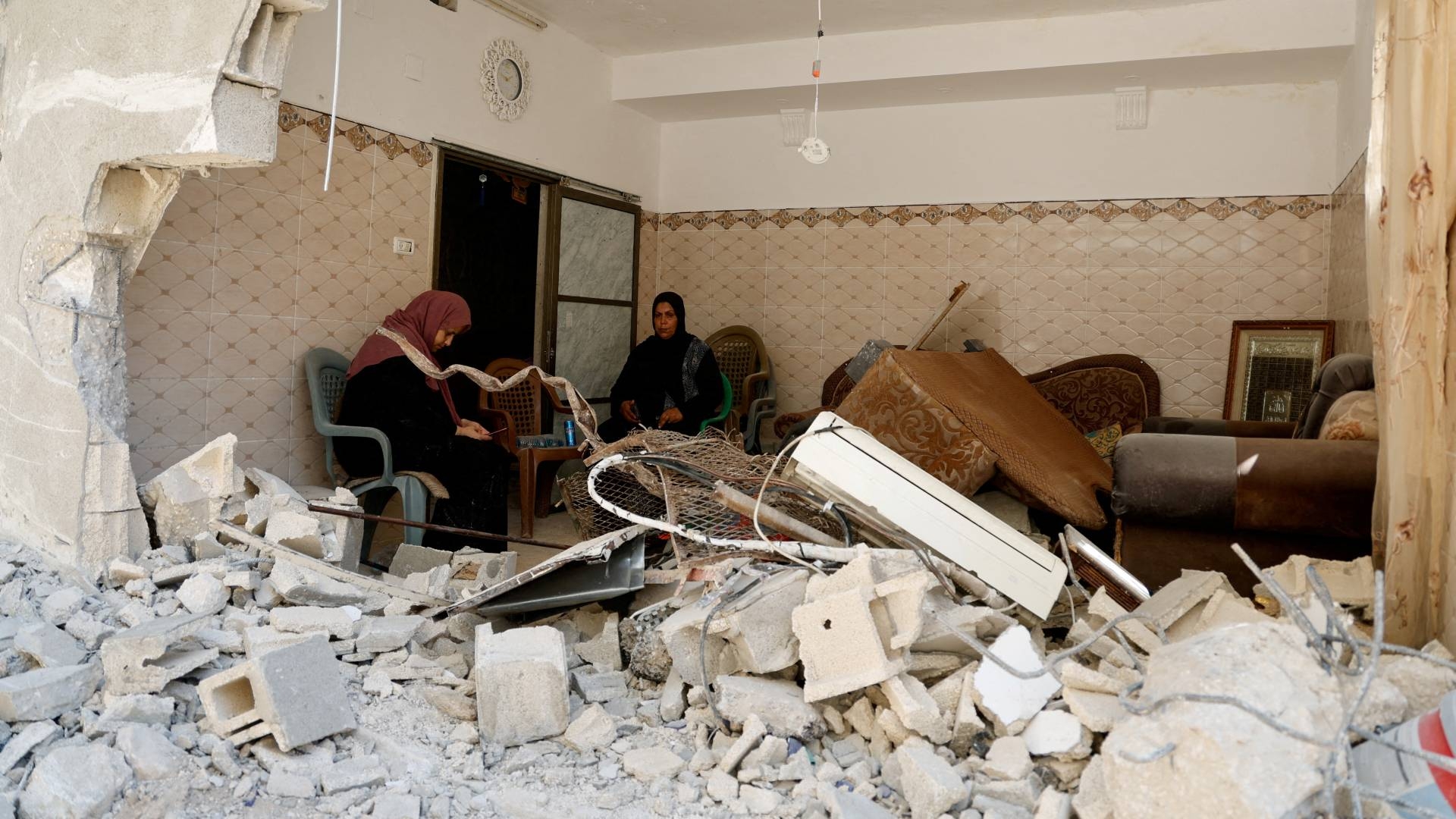
Um Yousef and her husband have lived in their home in the Nur Shams refugee camp near Tulkarm in the occupied Palestinian West Bank ever since they married 43 years ago.
And they are still there today. Even though it’s in ruins. The furniture smashed. No outside wall. Rubble everywhere. We are sitting on plastic chairs in what used to be the kitchen. There’s no running water or electricity.
Um Yousef says she has no intention of moving out and nor has her husband.
“This is the investment of 40 years of our life.”
She says she misses her sons and grandchildren, whose school books can still be seen scattered amid the debris. They used to live on the top floor but Israeli soldiers destroyed the stairs so they had to move out.
New MEE newsletter: Jerusalem Dispatch
Sign up to get the latest insights and analysis on Israel-Palestine, alongside Turkey Unpacked and other MEE newsletters
Her husband, Muhammed Shahada, shows us film of an Israeli military bulldozer being driven slowly into their house. There is no obvious military purpose, just wanton destruction.
We clamber our way out of the family home - and realise that it could have been worse for this elderly couple.
The home opposite has been entirely destroyed and is reduced to a pile of bricks and rubble.
We turn right down a narrow street where the military bulldozers have also been at work. Too wide for the alleyways in this part of the camp, here they have ripped the front walls off houses and shops, leaving glimpses of everyday lives torn asunder in their wake.
In one room, a painting of three red roses still hangs askew on the wall. A pair of trousers dangles from an adjacent peg, shoes are neatly stacked on shelves, and faded stickers of butterflies and flowers adorn a fridge.
As a result, families are obliged to live their lives exposed to the elements. Some have put up curtains to give themselves some privacy. We spoke to one man in his ruined front room where he had lived with his wife for the last three decades.
Next door was his shop. It used to sell sweets, and was now destroyed. His livelihood and his home had been casually wiped out.
You can’t travel far without coming across another tragedy. We paused to chat to a lady at the entrance to a street. She was in mourning for her son.
Ashraf Abdallah, 20, was a popular boy who sold corn for a living and was well known around the camp, his mother recalled.
The bomb that killed him was dropped from an Israeli helicopter. It was Ashraf's day off. He had been sleeping in his sister’s room and rescuers found him curled up as if still asleep. He died a week later in hospital.
It was hot and sweaty walking round the crowded camp in the humid midsummer heat. Tulkarm is on the coastal plain, hard by the border with Israel and only about 12 kilometres from the sea.
Nur Shams translates as “the light of the sun”. Before Israel erected the separation wall, residents recall riding bikes as children to bathe in the Mediterranean.
The camp was built just east of the town in 1950 to accommodate Palestinians driven from their homes in what is now Israel in the areas near Jaffa, Haifa and Kissaria in the ethnic cleansing of 1948.
One of the most densely populated camps in the West Bank, some 12,000 of their descendants still live here. Judged by their actions, Israeli forces appear intent on making these families homeless once more.
There is nothing new about Israeli raids on refugee camps where Palestinian militant groups opposed to the occupation make no secret of displaying their presence and defiance.
The fighters of the Tulkarm Brigade had made Nur Shams a target for Israeli forces even before the escalation of hostilities that followed the Hamas-led 7 October attacks and Israel’s assault on Gaza.
Undeclared war
But residents say that recent attacks by Israeli forces have taken on a terrifying dimension not seen before that amounts to a form of collective punishment, in which civilians and infrastructure have been indiscriminately targeted without red lines or limitations.
In April, at least 14 Palestinians were killed and scores more injured as Israeli forces laid siege to the camp for more than two days, leaving bodies in the streets and ambulances and medical teams unable to reach the wounded.
At least 80 residents of the camp have been killed since 7 October, according to the local popular committee. About 300 homes have been completely destroyed and at least 2,600 have been damaged. The camp has been raided 28 times.
As in other West Bank camps where Israeli raids have resulted in fierce street fighting, notably Jenin and Balata, the residents of Nur Shams now live in constant fear of air strikes.
Some have covered the roofs of their homes in black tarpaulins in an effort to hide from the drones and helicopters circling overhead.
On Tuesday, five people were reported killed in the camp in an Israeli drone strike. The Palestinian Ministry of Health said those killed included a girl and a 50-year-old woman. Three men killed were identified as militant commanders.
On 2 July, four men were killed by an air strike which struck the camp’s main square. Three days earlier, Israel said it had killed a Palestinian Islamic Jihad leader in another air strike.
Some residents suggest that Israeli forces are now using air strikes to kill suspected fighters, rather than risk being drawn into street fighting by trying to arrest them in raids.
It is a tactic for which Israeli political leaders have claimed credit and appear ready to escalate even as the Palestinian death toll from this undeclared war on the refugee camps of the West Bank increases with each passing week.
On Sunday, Israeli Defence Minister Yoav Galant threatened to expand the use of air strikes following a meeting with Major-General Avi Bluth, the new commander of the Israeli army’s Central Command, which is responsible for operations in the West Bank.
“Months ago, I removed the restrictions on the operation of Israeli air force aircraft, including attack, by the Central Command in order to thwart terrorism without endangering soldiers unnecessarily - if necessary, we will expand this,” Galant said.
“I ordered [this] to make sure that all the operations of the terrorist brigades inside the refugee camps are thwarted. We go and crush them.”
We went to the small square in the centre of Nur Shams, which the air strike had hit at the start of the month and where Unrwa, the United Nations agency for Palestinian refugees, handles food distribution.
In the centre was a huge pile of rubble. It used to be a three-storey building used by a youth club, with the bottom floor set aside for a kindergarten.
On the far side of the square was an Unrwa building. It was damaged, though not destroyed, and locals told us it was still in use. We went to look, but it appeared to be empty.
Israel appears determined to undermine and destroy Unrwa, which has been the main provider of humanitarian aid to Palestinian refugees, now numbering almost six million people, around the region since it was set up in 1949.
Its attacks on the UN agency have taken many forms - diplomatic, political as well as the targeting of Unrwa facilities and employees. In Gaza, the agency says that at least 197 of its staff have been killed in the nine months of war up to 7 July.
In Nur Shams, the scale of the destruction in many parts of the camp recalls the horror of Gaza. Rarely visited by western journalists, the damage blows the mind.
As in Gaza, the Israeli assault has inflicted massive damage to civil infrastructure: schools, mosques, water, electricity and sewage systems. Commercial activity is impossible. Much of the camp is, by any normal standards, uninhabitable.
We walked down the Nablus Road, which used to be the commercial hub of the camp. The road itself has been reduced to rubble, with cars slowing down to walking pace to navigate past rocks and potholes.
By the side of the road bulldozers have dug deep holes in an apparent attempt to destroy the sewage and water systems. Puddles of brackish, stinking water emit a foul smell.
'My house is empty'
Two days after we visited Nur Shams camp the International Court of Justice, the United Nations’ top court, declared that Israel’s occupation of the West Bank was illegal and ordered Israel to pull out.
In theory, this should offer hope to refugees, but Israeli leaders have already denounced the judgement, meaning that residents in Nur Shams will continue living through the hell on earth of incessant Israeli attacks that they have already endured for months.
Responding to the ICJ’s opinion, Bezalel Smotrich, Israel’s far-right finance minister who is himself a settler and widely seen as a spokesperson for the settler movement, simply posted on social media: “The answer to The Hague – sovereignty now.”
There’s no end to the horror. We met a mother who’d lost four sons in Israeli attacks since 7 October. Samina Ghannam welcomed us into her sparse living room and told us how much she missed their company.
“They would come and visit me in the morning, drop by in the evening on the way back from work. My house is empty now. People loved them. They never caused any trouble for anyone.”
Tears filling her eyes, Ghannam recalled: “Before I lost my children I was watching what was happening in Gaza and praying for God to help them.”
An Israeli rocket claimed two of her sons, Amir and Ahmed Ghannam, aged 41 and 39, on 19 October. “They were standing with a group of friends after praying at a mosque when the group was struck by an Israeli rocket,” she said.
The brothers are now among the many dead Palestinians whose names and faces have been memorialised on posters bearing the insignia of armed groups displayed on walls around the camp.
Their younger brothers, Mahmoud and Saleem, were among the Palestinians killed during the Israeli raid in April. Mahmoud, 24, was hit by a sniper’s bullet while on his way home.
“There was a drone overhead and we knew about the drone but not about the sniper,” his mother said.
'Today I opened a closet and found the clothes of my children. I started hugging them. I started to cry'
- Samina Ghannam, mother who lost four children
Saleem, 29, was also shot by a sniper, just outside the house, she added. She watched helplessly as he bled to death over hours because an ambulance could not reach him.
“Blood was pouring out of him like water. They brought him into the house and laid him on my lap.”
We asked whether any of her sons were wanted or warrants were out for their arrest. She replied: “None of that. We are a peaceful family.”
Ghannam has recently lost a fifth child too. Abd Allatif Ghannam was the oldest of these five brothers. He died of cancer a month after the death of his two youngest siblings.
His mother told us: “Today I opened a closet and found the clothes of my children. I started hugging them. I started to cry. It is very hard to lose five children and have nothing left. You can’t imagine the pain of losing your sons.”
Middle East Eye delivers independent and unrivalled coverage and analysis of the Middle East, North Africa and beyond. To learn more about republishing this content and the associated fees, please fill out this form. More about MEE can be found here.


